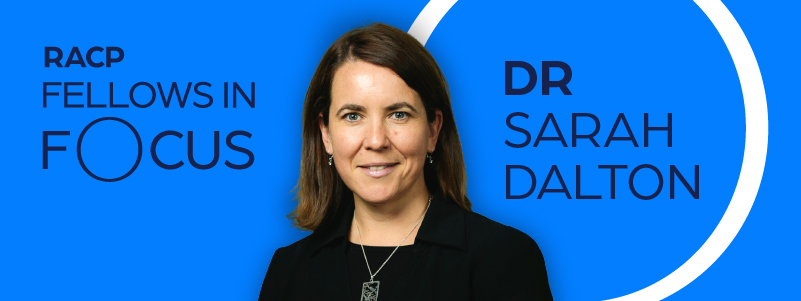RACP Fellows in Focus: Dr Sarah Dalton
Date published:
05 Mar 2021

"I've spent many years feeling like a platypus."
For Dr Sarah Dalton, feeling like the odd person out and not fitting a mould has not only been important to her personally but also, "a really important thing to offer the system". As a doctor that specialises in acute care paediatrics and also has a toe in a systems role, this idea of being a platypus is certainly justified and allows Sarah to embrace her strengths and her value-adds.
"It's unusual. Having this level of interest in my system role and then quality and safety and system improvement, there's hardly anyone who does that. So, in the little Venn diagram of paediatrics, acute care and system improvement, there are very few people who sit in that space where they bring all those different things together."
Sarah, who works at the Children’s Hospital in Westmead as a paediatric emergency consultant, was previously President of the RACP’s Paediatrics & Child Health Division between 2016 to 2018. During her day-to-day, she has seen up to 200 children presenting to the emergency department each day with urgent issues.
"Most people who do paediatrics don't want to do acute care because it's a bit scary. You have to make decisions and move quickly, and a lot of people don't like that. When you do emergency medicine, which is all about getting in there and cracking chests and saving lives and doing CPR. A lot of people don't like paediatrics because it takes too long, the parents are worried and you have to reassure them. Kids are a bit scary cause they get sick really quickly and you don't want to miss something."
Although scary at times, for those that want to specialise in paediatrics, Sarah's advice is expansive. "My advice would be to reflect on what gets you out of bed every morning. What do you really, really enjoy? What would you do for free? What matters to you in your life? What is it that you really want? Stopping and thinking about what you want. What matters to you most that will still matter to you in five or ten years’ time are the grounding conversations to have in making any choices around what you do with your career."
Taking her own advice, Sarah's career path is littered with highlights that honour this notion. Sarah completed a Fulbright Scholarship in Clinical Leadership and she has held executive leadership roles in several NSW Health entities, including her current role as Director of Clinical Engagement at eHealth NSW. Her leadership strengths sees her apply coaching conversations to support her staff to unlock their own solutions and enables her to optimise her interactions and outcomes with key stakeholders. This practice inspired Sarah to complete the INSEAD Coaching Certificate and she now offers to coach healthcare professionals, "I think communication skills are by far the most important thing we need, to be a doctor. You have to be able to listen and understand and explain what's happening to your patients. You have to be able to listen, to explain and understand what's going on with your junior doctors. You have to be able to do that with the team around you, and with the environment that you work in."
An ability to communicate goes hand-in-hand with an ability to problem solve and that is where Sarah finds the joy within her role, "I've always been a problem solver. I feel like I do that with my patients, with their diagnosis and their treatment, but I now do that at a system level as well." For Sarah, this natural inclination to solve problems was also the catalyst to examine what it means to be a good doctor. She explained that when you're a trainee you've always got supervision, "you've always got someone who's marking you, assessing you and you're doing exams, getting feedback all the time." However, once you begin consulting the landscape changes and the support dries up, so how do you maintain the standards? This lingering question was the driving force behind her involvement in the College and more specifically the project to improve standards, practices and accountabilities of doctors in medicine. The 'SPPP' or 'Supporting Physicians Professionalism and Performance' and sought to answer, "what does a good doctor look like?"
"If you have to have the medical expertise, you've got to be able to make the diagnosis and give the treatment. But there's a whole wheel of competencies that go with that. You have to be a good leader, a good communicator, a good educator, you have to do advocacy, you have to understand research.”
Unsurprisingly, when asked about how she would like to leave her impression upon medicine Sarah offered, "One of the trainees that I coach sent me a really nice card recently. It said, "thank you for being the role model, an inspiring leader and for creating a space for people who want to be a bit different. She also gave me a little fridge magnet of a platypus. I am proud of that legacy. You don't have to fit the mould. We have a very traditional conservative training experience and there's nothing wrong with that for the people it works for, but it doesn't work for everyone. Vive la difference."